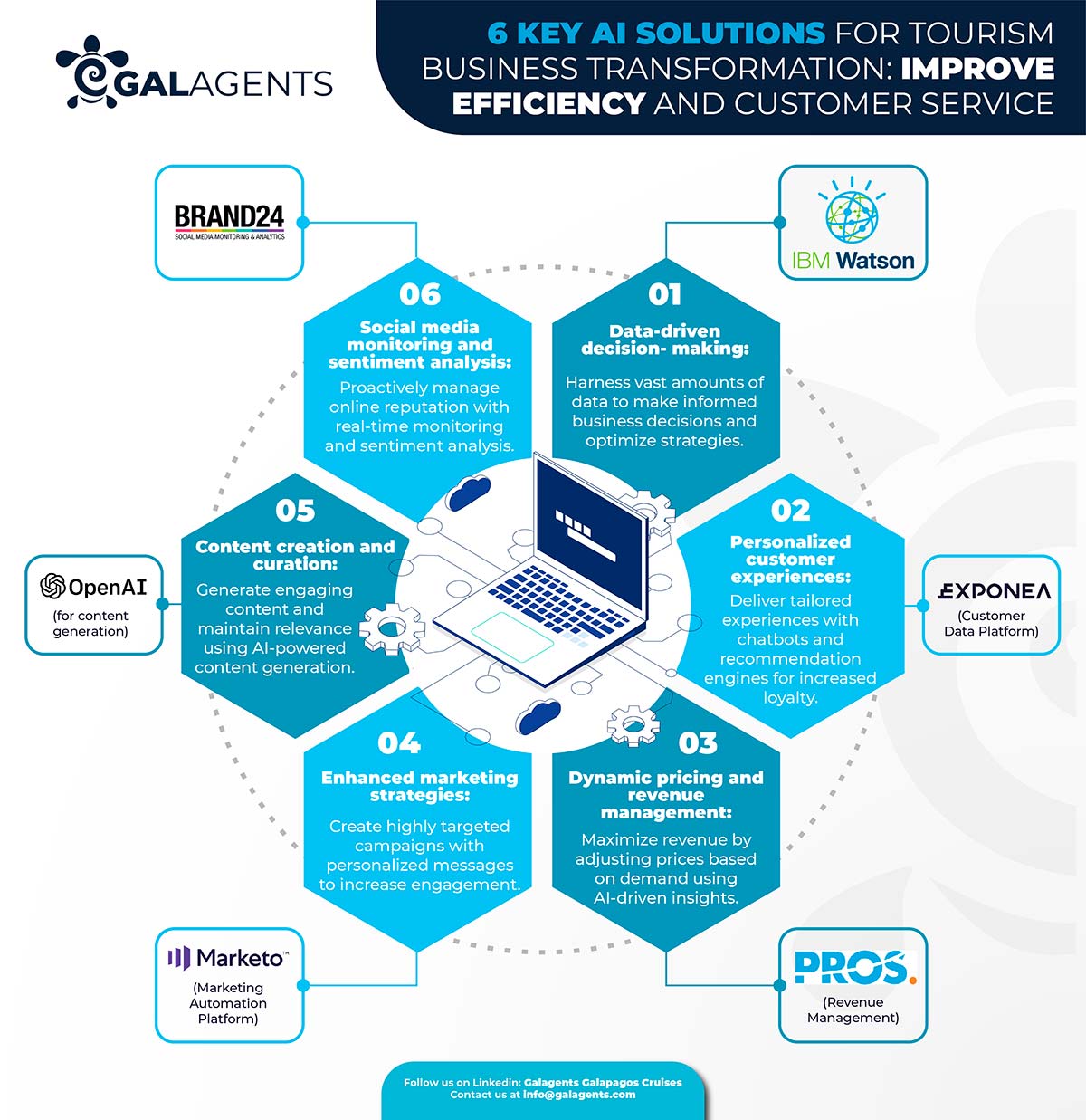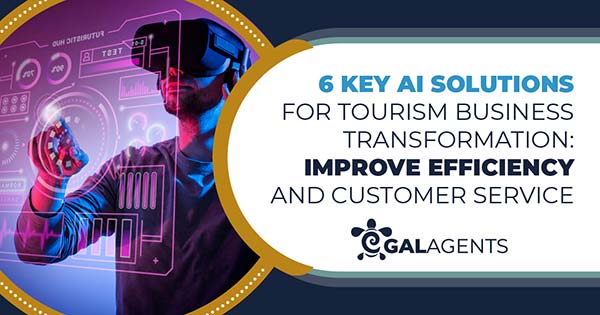The tourism industry has always been dynamic, with new technologies and trends continuously reshaping business operations. One of the most significant technological advancements in recent years is the development of Artificial Intelligence (AI). As a result, AI tools are now essential for tourism businesses developing new business strategies and marketing content. This article will explore how AI is revolutionizing the tourism sector and how companies can leverage these tools to enhance their operations and marketing strategies.
1.- Making decisions based on data
I tools enable tourism businesses to leverage the power of data by collecting and analyzing vast volumes of data from several sources, including social media, online reviews, and booking platforms. The patterns and trends from this data may then be utilized to get essential insights into client preferences and behavior. As a result, firms are more equipped to make choices like altering pricing tactics, locating viable markets, or customizing goods and services to target particular clientele groups.
AI tool recommended: IBM Watson Analytics
Best Practice recommended: To get a thorough insight into your business, integrate several data sources, including customer reviews, booking information, and social media analytics. Then, make business decisions such as pursuing new markets, enhancing product offerings, and adjusting your overall strategy using AI-driven insights to spot trends and patterns.
2.- Personalized customer experiences
Travelers today are looking for more specialized and distinctive experiences. Chatbots and recommendation engines, two examples of AI-driven solutions, may assist companies in providing consumers with individualized experiences that are catered to their unique requirements and preferences. Businesses may give individualized suggestions on attractions, lodging, and activities using AI to analyze client data and find trends and tastes. This improves the client experience and boosts repeat business and customer loyalty.
AI tool recommended: Exponea is an illustration of an AI tool. (Customer Data Platform)
Best Practice recommended: The best approach is to identify several client profiles based on their interests and behavior using AI-driven customer segmentation. Then, use chatbots and recommendation engines to provide individualized advice and help clients on your website and mobile app in real-time, delivering a seamless and customized user experience.
3.- Dynamic pricing and revenue management
Optimizing pricing to maximize income is one of the significant difficulties facing the tourist sector. AI-powered technologies may examine massive amounts of information, including historical booking data and market trends, to create more precise pricing and revenue management plans. Businesses may use dynamic pricing models to change their rates in response to demand, keeping their prices competitive and profitable even during slow periods.
AI tool recommended: PROS Revenue Management
Best Practice recommended: For accurate price forecasts, it is crucial to continuously feed your AI tool with updated historical booking data and market trends. Then, to maximize income while remaining competitive and appealing to your target clients, dynamically modify your rates depending on the AI-driven recommendations.

4.- Improve marketing strategies
By helping firms to develop highly focused ads that connect with their audience, AI can transform the tourist marketing industry. An in-depth consumer profile may be created using AI-driven technologies by analyzing user data, including demographics, hobbies, and online behavior. Personalized marketing messages and promotional offers more likely to appeal to each customer category may be made using this information. Additionally, by determining the most efficient channels and approaches for contacting their target demographic, AI-powered marketing solutions may help organizations improve their marketing budgets.
AI tool recommended: Marketo (Marketing Automation Platform)
Best Practice recommended: Use artificial intelligence (AI) to evaluate consumer data and find the best marketing channels to reach your target demographic. Then, develop customized marketing campaigns based on unique consumer profiles to boost engagement and conversion rates. Finally, to make your marketing budget and plans as effective as possible, constantly monitor and assess your campaigns’ success.
5.- Content creation and curation
To draw in and keep customers, tourist firms must produce compelling content. By automating processes like keyword research, subject brainstorming, and content curation, AI solutions can help organizations create high-quality content. Businesses may create pertinent and exciting content for their websites, social media channels, and email campaigns using AI-powered content-generating services. This helps firms continuously provide great content for their audience while saving time and money.
AI tool recommended: GPT-4, an example AI tool from OpenAI (for content generation)
Best Practice recommended: Use AI-generated content to create exciting and pertinent information for your audience. Use AI technologies for keyword research and subject generation to ensure your content aligns with the most recent trends and your audience’s interests. To keep your material valuable and relevant to your target audience, update and curate it frequently.
6.- Monitoring social media and sentiment analysis
Managing a company’s online reputation is more crucial than ever in the era of social media. By tracking mentions of their brand, goods, or services on social media sites, AI solutions may help tourist firms remain ahead of the curve. The general sentiment of these mentions may then be ascertained using sentiment analysis algorithms, enabling firms to spot potential problems and rectify them before they get worse. This proactive method of reputation management may significantly increase client loyalty and happiness.
AI tool recommended: Brand24 (Social Media Monitoring Platform)
Best Practice recommended: Setting up immediate notifications for mentions of your company, goods, or services on multiple social media networks. Utilize AI-driven sentiment analysis to comprehend the underlying tone of these mentions and spot any possible problems. To increase customer satisfaction and loyalty, swiftly respond to negative criticism and actively engage in customer interaction.
Artificial intelligence is revolutionizing how tourism companies are run by providing creative answers to the sector’s myriad problems. Tourism companies may develop fresh ideas, streamline their processes, and produce more exciting marketing materials by utilizing AI solutions. Adopting AI-driven solutions will become increasingly important for organizations trying to stay competitive and satisfy the constantly changing demands of their clients as the sector develops. Tourism businesses may improve their offers and contribute to the future development of a more sustainable, lucrative, and customer-focused industry by utilizing the power of AI.

